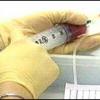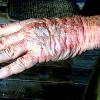

- » Montana family travels to Seattle for son's chemotherapy treatments, gets truck stolen
- » Michael Douglas says he's treating throat tumor as 'curable disease'
- » Paraguay says president to undergo 6 chemotherapy sessions for non-Hodgkin's lymphoma
- » 'Lion King' cast and crew hold donor drive at Broadway theater for ailing 11-year-old actress
- » More US pets receive high-tech medical care, and it sometimes leads to better care for humans
- » British author Hitchens undergoing chemotherapy on esophagus, cancels some appearances
- » FDA announces new effort to reduce problems, deaths from drug pumps
- » Celgene's Revlimid meets study goal of slowing multiple myeloma progression
- » Judge drops case against family of Sleepy Eye teen after cancer-free diagnosis
- » Now what do I do? Suddenly women in their 40s must ponder whose mammography advice to follow
Topics: Health Tags: Chemotherapy View |
Topics: Health Tags: Chemotherapy View |
Topics: Health Tags: Chemotherapy View |
|||||||||
Topics: Health Tags: Chemotherapy View |
Topics: Health Tags: Chemotherapy View |
Chemotherapy, in its most general sense, is the treatment of disease by chemicals especially by killing micro-organisms or cancerous cells. In popular usage, it refers to antineoplastic drugs used to treat cancer or the combination of these drugs into a cytotoxic standardized treatment regimen (chemotherapy regimen). In its non-oncological (Oncology) use, the term may also refer to antibiotics (antibacterial chemotherapy). In that sense, the first modern chemotherapeutic agent was Paul Ehrlichs arsphenamine, an arsenic compound discovered in 1909 and used to treat syphilis. This was later followed by sulfonamides (Sulfonamide (medicine)) discovered by Domagk (Gerhard Domagk) and penicillin discovered by Alexander Fleming.
Most commonly, chemotherapy acts by killing cells that divide rapidly, one of the main properties of cancer cells. This means that it also harms cells that divide rapidly under normal circumstances: cells in the bone marrow, digestive tract and hair follicles; this results in the most common side effects of chemotherapy?myelosuppression (decreased production of blood cells), mucositis (inflammation of the lining of the digestive tract) and alopecia (hair loss).
Other uses of cytostatic chemotherapy agents (including the ones mentioned below) are the treatment of autoimmune diseases such as multiple sclerosis, Dermatomyositis, Polymyositis, Lupus, rheumatoid arthritis and the suppression of transplant rejections (see immunosuppression and DMARDs). Newer anticancer drugs act directly against abnormal proteins in cancer cells; this is termed targeted therapy.





